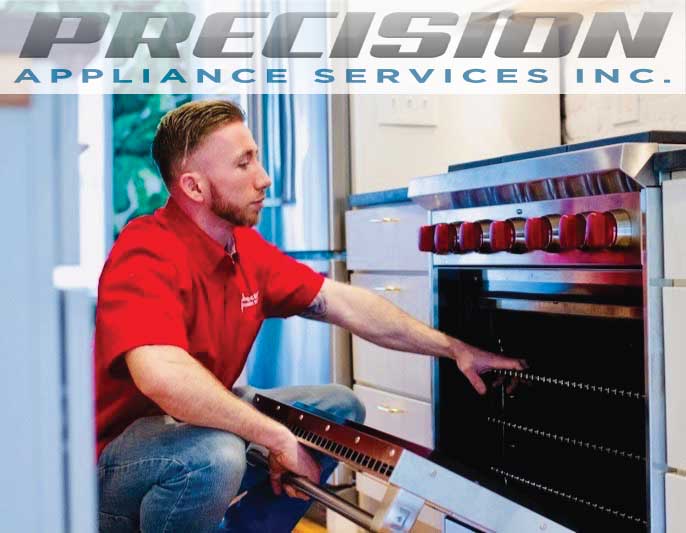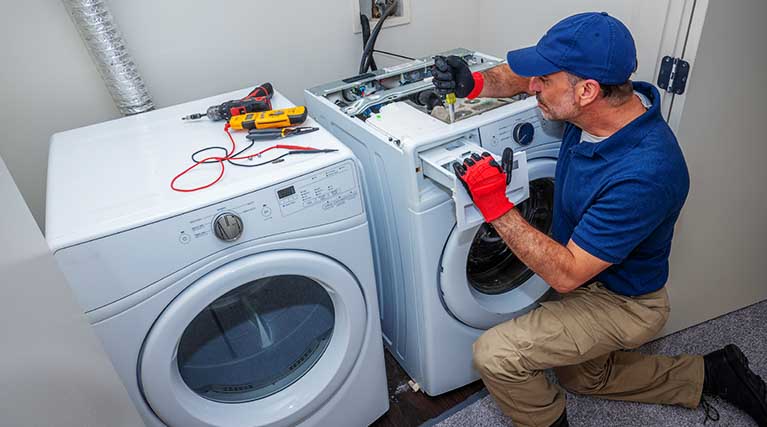Refrigerator Troubleshooting Checklist – Dependable Refrigeration & Appliance Repair Service Washing Machine Repair
Refrigerator Troubleshooting Checklist – Dependable Refrigeration & Appliance Repair Service Washing Machine Repair
Blog Article
The Ultimate Guide to Understanding Device Repair Work at Home
When your fridge quits cooling down or your oven rejects to warm, it can feel overwhelming. Recognizing home appliance repair in the house can save you time and money. You'll learn to identify signs, make use of essential tools, and follow an organized troubleshooting process. But prior to you start, there are important security precautions you need to take into account. What are one of the most typical troubles, and how can you repair them? Let's check out the fundamentals.
Common Appliance Issues and Their Symptoms
When your appliances start breaking down, it's crucial to identify the signs early. Ignoring them can cause larger concerns and costly repairs. If your refrigerator isn't cooling down effectively, you could discover cozy spots or condensation forming. This can suggest a stopping working compressor or an obstructed vent.Your dishwasher may show troubles with dirty recipes or unusual sounds throughout cycles. If you listen to grinding or clanking, it's time to investigate.A cleaning machine that won't rotate or drain can leave you with soggy laundry, recommending a clogged drainpipe or a malfunctioning pump.Lastly, if your stove's temperature appears off or it takes for life to pre-heat, you may be taking care of a faulty thermostat. By remaining alert to these symptoms, you can attend to concerns before they escalate right into significant repair work.
Crucial Devices for Appliance Repair Work
When you're dealing with home appliance repair work in your home, having the right devices is crucial. Basic hand tools like screwdrivers and pliers will certainly aid you dismantle and deal with various devices, while electric testing tools assure you're functioning securely with wiring. Let's look at what you need to start on your repair work trip.
Fundamental Hand Devices
Having the right tools is essential for efficient appliance fixing at home. Beginning with a trusted screwdriver set, including both flathead and Phillips kinds, as screws prevail in device setting up. Pliers are also vital; they assist with gripping, twisting, and reducing cords or little elements. A pair of needle-nose pliers can get to difficult situations conveniently. You'll require an excellent flexible wrench for tightening up or loosening nuts and screws. An energy blade comes in handy for puncturing packaging or insulation. Ultimately, don't neglect a tough workbench or surface area to securely organize your tools and components. With these fundamental hand tools, you'll be well-prepared to deal with most device fixings that come your method.
Electrical Screening Instruments
Along with standard hand devices, electrical screening gadgets play an important role in home appliance repair work. These tools help you detect electric issues and guarantee appliances function safely. A multimeter is important; it determines voltage, current, and resistance, permitting you to determine issues quickly. A non-contact voltage tester is another must-have, letting you find real-time cables without making direct call, improving your safety and security. Clamp meters are excellent for gauging existing circulation in wires without disconnecting them, conserving you time and initiative. Additionally, circuit testers can swiftly examine if electrical outlets are working appropriately. By making use of these devices, you'll enhance your troubleshooting process and boost your repair work abilities, making appliance upkeep a lot simpler.
Step-by-Step Guide to Diagnosing Home Appliance Issues
When your appliance breaks down, it can be frustrating, however diagnosing the problem doesn't have to be frustrating. You'll discover to identify usual problems and use efficient troubleshooting strategies. Let's go through the actions to obtain your home appliance back in functioning order.
Typical Device Problems

Fixing Techniques Discussed

Fixing Major Cooking Area Devices: A Closer Look
Have you ever wondered exactly how to deal with typical issues with your kitchen home appliances? Repairing significant kitchen area devices like fridges, stoves, and dishwashers can be easier than you think. Beginning by recognizing the issue-- whether it's a refrigerator not cooling or an oven that will not heat up. Often, a simple reset or checking the power resource can address the issue.For fridges, clean the condenser coils and check the door seals. If your oven's not home heating, examine the heating component and thermostat. Dishwashers might simply require a tidy filter or a reset to obtain them back in action. Constantly unplug the device prior to diving right into repairs to guarantee your safety.Don' t neglect to seek advice from the individual manual for particular troubleshooting ideas associated to your design. With a bit of patience and the right tools, you can confidently take on device repair services and conserve money at the same time!

Troubleshooting Laundry Devices: Tips and Techniques
When your washing home appliances start breaking down, it can really feel frustrating, but fixing them doesn't have to be a trouble. Begin by examining the power supply. Confirm the home appliance is plugged in and the electrical outlet is operating. Next off, evaluate the door or lid button; a faulty switch can avoid the equipment from operating.For washing machines, if it's not rotating, look for unbalanced lots. Rearranging the clothing may solve the problem. If your clothes dryer isn't heating, tidy the lint filter and check the vent for blockages.Listen for unusual sounds; they can show a trouble. If your device is dripping, inspect the hoses for fractures or loosened connections. Paper any type of mistake codes shown on digital displays, as they can direct you in identifying the problem. Lastly, consult the customer manual for specific fixing pointers related to your design.
Security Precautions to Take Throughout Repair works
Prior to you start any home appliance fixings, it's necessary to prioritize security to avoid accidents or injuries. First, unplug the home appliance or shut off the circuit breaker to ensure no power reaches it while you work. Use shielded devices to reduce the risk of electric shock. Use safety goggles and handwear covers to shield yourself from sharp sides or debris (Dependable Refrigeration & Appliance Repair Service Oro Valley AZ 85755).Make certain your work area is tidy and well-lit, so you can see what you're doing. Keep children and pets far from the location to stay clear of distractions and possible hazards. If you're managing gas devices, be added cautious; look for leakages before proceeding.Take your time, and don't hurry with fixings. If you really feel unsure about any type of action, it's far better to stop briefly and study than to think. Adhering to these preventative measures will certainly help develop a safer environment for your DIY appliance repair work project
When to Call an Expert for Aid
Exactly how do you know if it's time to contact a professional for appliance repair services? If you have actually tried basic troubleshooting without success, it's a clear indication. For example, if your appliance still will not begin or shows uncommon sounds after resetting it, do not think twice to seek expert help.When you see leaks, smoke, or burning smells, prioritize safety and call a pro promptly. These concerns can result in more substantial damages or present dangers to your home.Also, if your home appliance is under service warranty, contacting a specialist is commonly the very best route. They can assure that repair work will not invalidate your service warranty, saving you money in the lengthy run.Finally, if you're uncertain or awkward with complex repairs, it's important to leave it to the specialists. Remember, dealing with challenging concerns without the appropriate competence can bring about pricey errors. Trust fund a specialist when in doubt!
Regularly Asked Inquiries
How Can I Stop Home Appliance Problems in the Future?
To stop appliance issues in the future, you need to carry out normal upkeep, look for wear and tear, tidy filters, and avoid overloading. Staying proactive will assist expand their lifespan and keep them running smoothly.
What Are one of the most Common Do It Yourself Home Appliance Repair Work Mistakes?
You may ignore security preventative measures, skip troubleshooting actions, or use inaccurate tools when trying DIY appliance repair work. Hurrying the procedure or neglecting producer standards can lead to more considerable issues and pricey mistakes. Remain patient and notified!
How Do I Know if a Part Needs Substitute?
You can tell if a component needs replacement by examining for uncommon noises, leakages, or irregular efficiency. If the device read more has a hard time to run correctly or reveals noticeable damages, it's most likely time for a substitute.
Can I Use Generic Parts for Home Appliance Services?
Yes, you can make use of generic components for device repair work, yet determine they're compatible - Dependable Refrigeration & Appliance Repair Service Washing Machine Repair. Generic components could conserve you cash, yet they could impact performance or durability, so weigh your alternatives thoroughly prior to making a choice
What Service Warranties Cover Appliance Fixes?
The majority of device service warranties cover repair work for manufacturing defects, but they commonly leave out damages from abuse. Check your service warranty terms carefully, as some could call for using licensed specialists and initial parts for coverage to remain legitimate.
Report this page